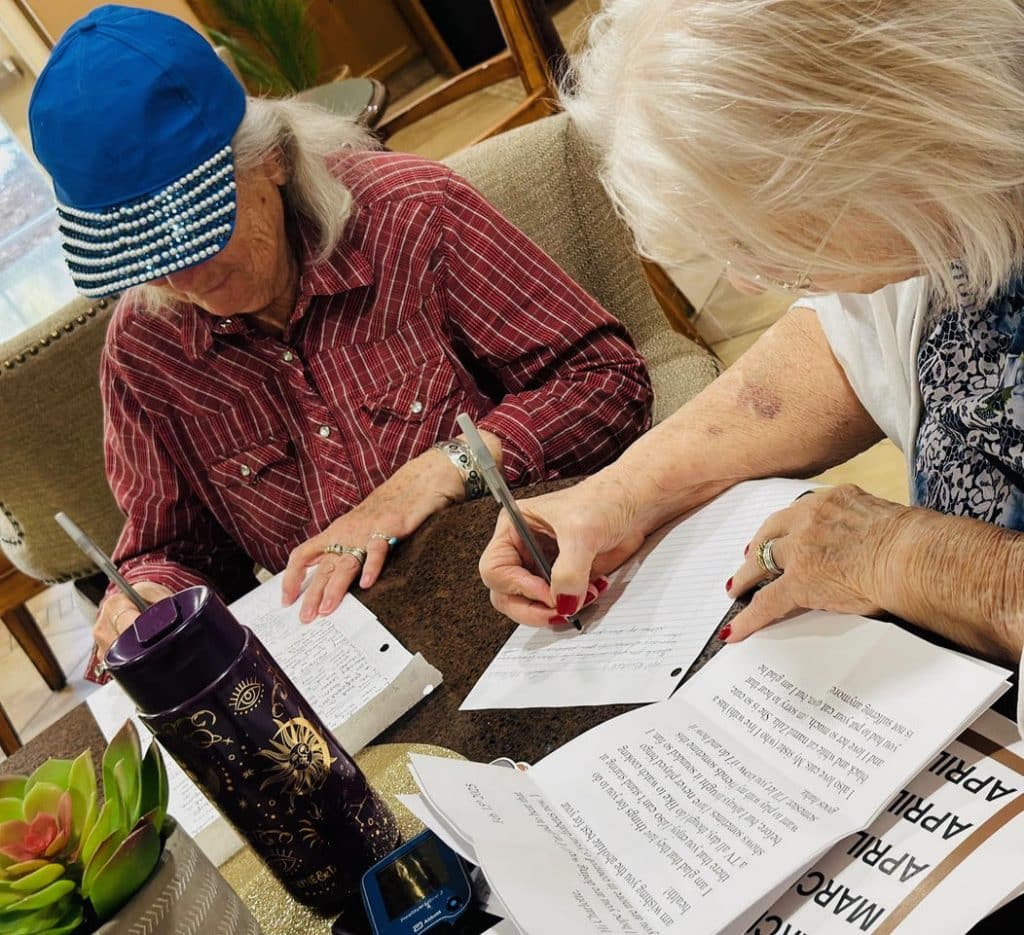Last summer, Emma Patterson had a core-shaking realization at her grandmother’s funeral.
“People were talking about the woman she was, the mother she was … and the person they were talking about wasn’t the person I grew up getting to know, because when I knew her, she had Alzheimer’s disease,” Patterson said. “I thought, how shallow am I that I let her disease depict who she was to me? She was so much more.”
Patterson always knew she wanted to work with the elderly after graduation—she first got the idea when, as a child, she’d bond with her grandfather by helping him with his physical therapy exercises. But it wasn’t until last year’s pivotal moment that she realized why.
“I don’t want people to be seen only for their physical and mental limitations,” she said. “For older populations, they’re often seen that way automatically.”

That’s why the Honors College student and aspiring physical therapist started an ambitious pen pal program this spring, opening a communication channel between seven NAU students and seven residents at The Peaks, a senior living community in Flagstaff.
Every week, Patterson visits The Peaks to collect letters from participating residents, even helping some with physical challenges compose their letters. She comes up with a different prompt every time: What’s your favorite Valentine’s Day memory? Who do you most admire? What makes you laugh and what makes you cry? Then, she delivers the letters to student participants—most of whom she recruited from Melissa Schonauer’s Biology of Cancer class—and collects their responses. Each Peaks resident writes to the same student every week, and vice versa, allowing a closer relationship to form over time.
Patterson didn’t expect an outpouring of enthusiasm from students when the pen pal club got up and running, but that was exactly what she got.
“Lots of the students are telling me things like, ‘My grandparent was in a senior living facility and felt isolated sometimes, and they would have benefited from something like this, so that’s why I signed up,’” she said. “They keep telling me it’s such a cool experience. It seems like people wanted to do it for themselves and are truly enjoying it.”
Fostering empathy
The pen pal project is just one part of Patterson’s independent study course with faculty advisor Kerri Quinn, an assistant teaching professor in the Honors College, examining how written relationships like these can encourage empathy and understanding.

“In science, there’s something called the halo effect,” Patterson said. “It’s the idea that, once we form an initial view of someone, we just naturally accept it and don’t look into it any further. What the pen pal club aims to do is mitigate the halo effect, challenge different generations’ assumptions about each other and encourage empathy.”
Quinn, no stranger to pen pal programs, said writing letters to others can also benefit oneself—especially in the digital age. Last spring, Quinn facilitated a handful of pen pal relationships between Puente de Hóhzó Elementary School students and NAU students in her Writing to Change the World class. Quinn said some students enjoyed it so much that they carried on their correspondence long after the spring semester wrapped up.
“In a world inundated with noise and distractions, I believe our Gen Z students are looking for and need different ways to connect that are real and meaningful,” Quinn said. “These students are creative and imaginative, and they jump at the first opportunity to write, pen to page. This is a visceral experience because our stories live in our bodies and by writing them down, either in a journal or to a pen pal, students get to share who they are and what they’ve experienced.”
Later this semester, Patterson will interview her pen pal club participants about their experiences to examine how the correspondents’ impressions of each other changed over time. She’ll also make a website with more information on the project for families of Peaks residents and other community members who may be interested.
Ultimately, Patterson hopes the project not only sparks joy for the participants but also inspires more college students to get to know the older people in their lives a little better.
“A lot of students at NAU want to go into a healthcare field,” Patterson said. “Whether they go into healthcare or something else, they’re probably going to need to communicate with people of all ages and backgrounds. If we want to care for them and serve them well, it’s important to start with empathy.”
Jill Kimball | NAU Communications
(928) 523-2282 | jill.kimball@nau.edu




